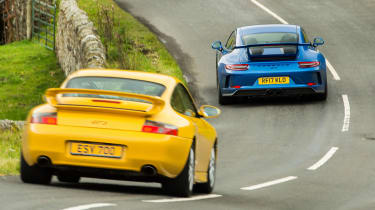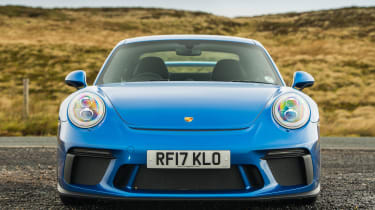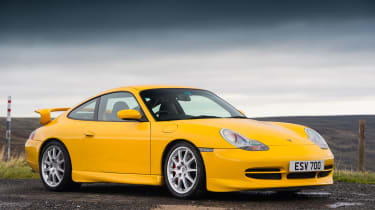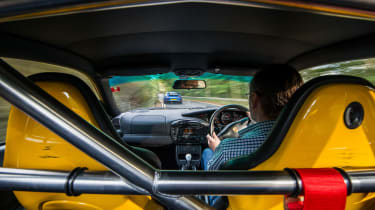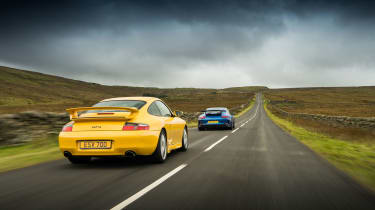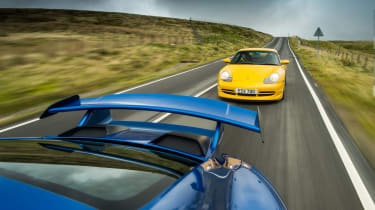Porsche 911 GT3 996 vs GT3 991: old vs new hardcore Porsches
The GT3 symbolises everything we look for in a great drivers’ car – the ability to thrill. We drive the 996 and 991 back-to-back.
It didn’t take long to pinpoint the car that set the mould for today’s Porsche 911 GT3. It really had to be another 911, and specifically the original GT3 that launched the whole line back in 1999. We looked in vain for a model from another car maker, for the simple fact is that no one has taken on the 911 at its own game and won, although we should give an honourable mention to the Dieppe-based Alpine company, which had a darned good stab at it with its fine- handling rear-engined A610.
Amongst 911s you could make a case for many an RS model, or even the 1987 Carrera CS (for Club Sport), being a forerunner of the current GT3, but in the end the 996 GT3 was just too neat to ignore for the purposes of this test.
The 996 has gone through the whole process of being new, then looking old, then becoming a classic. This early, first-generation car with its ‘fried egg’ headlamps looks as clean and smooth as a used bar of soap. I even like the rear spoiler, which has the appearance of a much larger one that was left too close to the fire and then folded in half. Alongside the 996, the current GT3 looks like a modern, military-grade evolution; bigger, beefier, festooned with scoops, spoilers and splitters, sitting on enormous, centre- lock alloys and arch-cramming tyres that give it a cartoonish stance. It really should be finished in flecktarn.
The 996 we’re driving is a ‘Comfort’ model that has had some Clubsport-spec parts added later, so while there’s a half- cage in the back and the shoulder-straps of a fat-webbed harness attached to its horizontal crossbeam, the seats are not the deep buckets that would normally accompany them. They have body-colour shells but look like they have the standard, plump seat padding crammed into them. Even staffer Will Beaumont, who is as thin as I like to imagine I still am, says he feels like he sits on not in them.
More reviews
Group tests
In-depth reviews
Long term tests
Reviews
No matter. Making the 996 GT3’s acquaintance again after so long is like rekindling an old relationship, in all the right ways. Within a couple of hundred yards, I’m smiling. Despite being named after a racing category, the GT3 didn’t weigh any less than the regular Carrera. The hollow clang you hear when you slam a door indicates that large expanses of sound-deadening have been deleted but, even so, it weighs 30kg more. However, from the first decent squeeze of the throttle you know there’s a delicious balance in favour of engine power over mass – and this despite quite leggy gearing in the lower ratios – that gives a sense of relaxed but irresistible pace.
There’s both instant and delayed gratification here. Instant in the multi- layered, rich complexity of sounds coming from behind when you’re just mooching along. It’s like listening to an orchestra and trying to pick out the individual instruments – induction, exhaust, valvetrain, etc. Delayed because there’s a stunning crescendo to the delivery; a keen, dry, nape-prickling yowl, just ahead of the 7500rpm red line.
You have to work for the rewards right from the off. The single-mass flywheel that enhances throttle response also lets the GT1-based flat-six’s lumpiness come through at idle and doesn’t cover up your shoddy clutch and shift work. The clutch is fiendishly heavy, so much so that you would avoid busy towns or cities, and the short-throw gearshift is terrifically positive, tactile and mechanical but, like the clutch, demands high effort. The potential for making the 996 GT3 stumble or jerk is ever present, so you must engage with the car, get the clutch pedal right to the floor and finesse your inputs, learn how to get the smoothness and flow out of it. And we haven’t even got to the handling yet...
The 996’s wheels are tucked far into its arches and also carry camber – it looks as though the car has been yumped and then frozen at full suspension compression. The expectation that this will deliver killer turn-in grip is demolished at the first roundabout, the GT3’s nose slurring uninterestedly wide of the anticipated line. It’s a rude reminder that this is an old-gen 911 and your input and skill are essential in unlocking the potential of the tail-heavy balance.
What’s also a bit of a throwback is the reaction of other road-users to our duo of Porsches. Back in the late ’80s, a Porsche in Guards Red would be sneered at and denied common courtesies such as being let out of side-roads. I thought we were past that, but within an hour of setting off for the Pennines our yellow and blue GT3s have wound up three other drivers, two of whom have overtaken in stupid places and one who has followed so close it’s a surprise his headlamps haven’t burned the paint on the 991’s back bumper.
That said, the LED headlights on the 991 can be irritating, having a very well defined upper band but ‘flashing’ when the nose bobs over bumps. In front in the older car, I get used to the delayed flash in the mirrors that confirms I just hit quite a big bump in the 996.
An hour up the A1, we stop to eat and swap cars. Beaumont describes the 991 as a full-on supercar, a view that will ring true for me an hour or so up the road. The seat is just what I expected the 996 to have: a thinly padded, fixed-back shell that, happily, comes with a modicum of leading-edge height adjustment, so I can get the backrest angle I prefer. Mind, these are a £3500 option. The rest of the interior is the height of luxury compared with the plain cabin of the 996, which has more blank buttons than live ones.
> Ferrari 360 Challenge Stradale vs Lamborghini Huracan Performante
The newer engine has a decent amount of character on start-up but it’s not as saucy or layered as the one in the 996 and, oddly, this PDK-equipped car gives a distinct chuff! noise from the engine bay every time you depress the throttle to set off. On the move, too, this flat-six sounds less interesting, the engine note more a bassy monotone, and there’s an uncomfortable resonance at 2800- 3000rpm in top, which is bang on 70mph.
It feels like a great slab of 911 after the 996 – a high-waisted, bulked-out evolution. But, holy moly, when you pin the throttle in the lower gears (actually, any gear, it turns out), the acceleration is sensational. And what tips it over into terrifying is seeing how rapidly the engine spins to 9000rpm and the crazy sound as it gets there – there are moments when the noise is so intense it drills right into your head.
The exit at Scotch Corner is closed so the nav takes us across to our hotel near Alson via the A68, which is an interesting road in the dark. Photographer Aston Parrott is leading in his nippy Skoda long- termer, Will is behind him in the 996 and I’m bringing up the rear. The 991 doesn’t seem to pitch or roll and, although the ride is firm, it copes easily with everything the road throws at it. There’s none of the dance that the 996 demands; no light nose to coax in with a heavy lift or a bit of trail-braking so that you set the balance for the exit. When the 996 brakes for a corner, in the 991 you often don’t have to – just guide it in and marvel at the astonishing grip.
Aston takes a wrong turn a few miles out, Will follows and I wait at the junction for them to realise. When they appear again, I lead the way, which gives a different perspective. For the next five or six miles, I leave Aston further and further behind but without ever going above 5000rpm or leaning too heavily on the 991’s huge reserves of grip. There’s little opportunity – or need – to go near the red line and you can only go so fast when you’re driving the road ‘blind’.
It strikes me that this is just like driving a massively powerful car in the wet; there is such an excess of performance that you can’t hope to exploit it, to wring it out, the upshot being that you feel slightly frustrated. All you have to measure your progress against is another car.
Will has been playing himself in gently in the 996, surprised by its fondness for wandering, even on the A1, then rather shocked by the amount of interaction the 996 chassis demands, and all too aware of its lack of traction or stability control.
‘For someone who isn’t used to 911s, or at least 911s that actually feel rear- engined, the 996 is initially quite unnerving in a corner,’ he later confirms. ‘It feels like it wants to oversteer on turn- in, then understeer everywhere else. At night, on patchy, bumpy, wet roads you don’t know, it’s intimidating.’
Properly wet roads greet us the next morning and I elect to stick with the 991. How does it feel with dampness reducing the grip from those fat, oh-so-sticky Michelin Cup 2 tyres? Very good, is the answer. There’s a lot that is so right about this car. It might look a lot bulkier than the 996 but, while the power has gone up by almost 40 per cent, from 360 to 493bhp, the mass has increased by just six per cent, from 1350 to 1430kg. The bottom line is the 996 GT3 has a power- to-weight ratio of 271bhp per ton while the 991 boasts 350. Which is telling.
As the 996 GT3 is an enhanced version of the 996 Carrera, so the 991 is an enhanced version of the plain 991 Carrera, which is the least 911-like 911 yet made. Each evolution of the 911 has attempted to capitalise on the advantages of the rear-engine layout while reducing its negative effects, and with the 991 this has reached the point where the car no longer feels like it has the mass of an engine hanging out beyond the rear axle. Yet the traction says it is. Equally, rarely do you get the sensation that the front end is light and is carrying significantly less of the load; the 991 doesn’t pitch and roll, squat and dive to any degree that reveals where its masses lie.
Straight after the 996, this feels odd, but after a few good miles you pick up on the traces that still exist, and turning off stability and traction control for low- speed shenanigans reveals the truth of its layout. The wet surface lets the rear step smoothly out of line, the instant delivery of the flat-six allows precise control, and the weight distribution means you’re still getting good drive even when the tail is kicked out.
Getting back into the 996 after a good stint in the 991 really is like stepping back in time. The initial sensory impact is from the heft of the controls, closely followed by the noise and the physics lesson at each bend. It might feel a bit vague in a straight line and understeery in tight corners, but on a challenging road everything snaps into sharp focus, and the feedback through the seat of your pants and the steering lets you know when you’ve got it just right. It is utterly beguiling.
Beaumont is now a huge fan. ‘You long for straights in the 991 to stretch the engine to 9000rpm. In the 996 you long for well-sighted corners where you can have a go at mastering its quirks. You might mess up the entry with understeer or the exit with a bit too much oversteer, but that only makes you want to find more bends to have another stab at it.’
Knowing how to drive a 996 also serves you well in the 991. You don’t have to go to its limits to make incredible progress but I reckon you should be aware of what’s going on, which laws of physics are being disguised, because they will reassert themselves if things get... sketchy.
In isolation, both of these GT3s are exceptional drivers’ cars, and mostly for the same reasons. Spend time in either and you acclimatise to their abilities and characteristics; you dial in and exploit; you seek and are rewarded.
They both ride well, have charismatic engines and deliver tremendous performance from a relatively small package. The 991 has just enough of the old 911 character to engage and entertain. And the 996 GT3? In comparison, it’s off the scale, double- concentrated, and just as fast as you want or need it to be, too.




